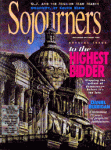The way we finance elections undermines our ideals of representative democracy. Because only the wealthy (or those beholden to wealthy interests) can run for office, we have an unrepresentative Congress. Minorities and women have less chance of being elected because they can't raise the money, don't have the money, or don't want to become beholden to the interests that can provide it.
Our system of private money politics establishes an institutional bias of unequal representation. Because elected officials are dependent on "big" money for their campaigns, our elected officials are naturally more responsive to those interests. Particularly in these days of budget cuts and down-sizing of government programs, our system of campaign contributions is buying a "budget buffer" for the wealthiest contributors. The voices of those who can't or don't give are muted by the dollar power of those who do give. Almost all members of Congress-whatever their original aspirations in seeking office-ultimately come around to representing the views of those who pay for their campaigns, if only to rationalize their continued service in Congress on behalf of "the people."
The impact of the private financing of our public elections is felt not just in paying more than our fair share in taxes, and not just in skewed policy-making. Because candidates are required to raise large amounts of money to wage competitive campaigns, today's money and politics system has distorted our American democracy. It has created a de facto
system of first-class constituents who've won super-rights based not on fairness or justice or anything other than their ability to deliver campaign funds. In the process, it has made second-class constituents out of the rest of us.
A government that, in Abraham Lincoln's words, is "of the people, by the people, and for the people" is still a long way from reality-not because of outside forces bent on subverting our American democracy, but because we Americans have allowed money, as opposed to ideas and character, to be the primary determinant of a person's political influence and opportunity.
As the 1996 elections approach and the news media and political pundits rate the viability of candidates not on what they say or what they've done, but on the size of their campaign war chests; as an election-conscious Congress deliberates on bills that will benefit a handful of monied interests at the expense of the rest of us; as candidates seeking our vote talk "populism" in 30-second TV spots financed by a few big contributors-it will be worth remembering that what we are seeing is simply the result of the old adage: You get what you pay for.
Until the citizenry as a whole, not just its wealthiest members, provides the resources for the campaigns of our elected representatives, the "savage inequalities" of the marketplace will continue to be the distinguishing characteristics of our democracy.
ELLEN S. MILLER is executive director of the Center for Responsive Politics in Washington, D.C. The center is a non-profit, non-partisan research organization that specializes in the study of Congress and particularly the role that money plays in its elections and actions.

Got something to say about what you're reading? We value your feedback!
